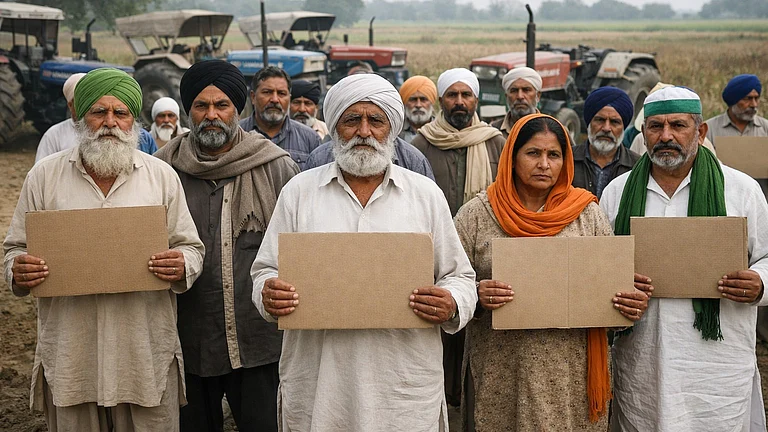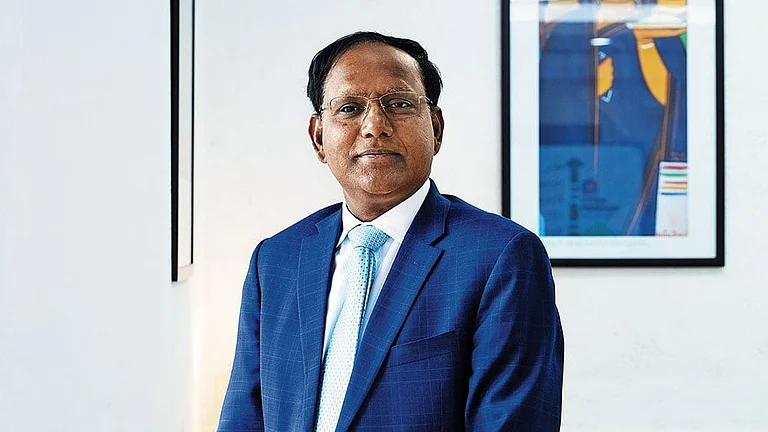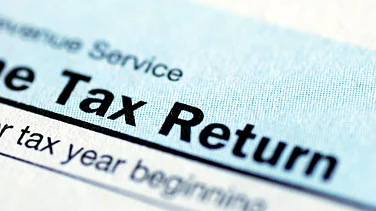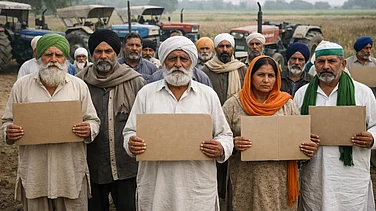Before joining an e-commerce company last year, Riya, a transgender person, had discussed in her HR interview that she was looking forward to her transition to womanhood. When she joined, however, an unwelcome reality greeted her.
She was stationed in Hyderabad's outskirts and had to oversee a warehouse's operations which required extreme physical exertion. Without gender-neutral bathrooms, she would have to rein in her bodily functions during 10-hour shifts. She could not bond with her coworkers as they failed to comprehend her dilemma and even treated her with disdain. When complaints to her line manager did not yield results, Riya quit the company and took up a job overseas.
On the other end of the spectrum is Manish Chopra, senior art director, Amazon India, who is also part of the LGBTQIA+ community. Chopra says that he is heartened to be at a workplace that treats everyone equally, irrespective of their gender or background.
"There are many good outcomes to coming out in an inclusive culture. I am respected for my contributions, performance and who I am. I have met people who did not know much about the LGBTQIA+ community but were welcoming and open to learning, which helped me establish many allies and contributed to my team's success," he says.
How can two professionals from the LGBTQIA+ community have such disparate experiences in their workplaces? The answer lies in how companies walk the talk regarding their diversity, equality and inclusivity (DEI) approach.
Embracing Inclusivity
According to professor Premilla D'Cruz, who teaches organisational behaviour at the Indian Institute of Management Ahmedabad, most organisations have neither embraced gender inclusivity nor put any particular effort into employing the LGBTQIA+ community.
"Often, the management assumes that there are no LGBTQIA+ employees and do not have policies to help those who decide to disclose their gender identity or sexuality," she states.
Some firms, like Zomato, are keen to hire more LGBTQIA+ members to build a vibrant gender-neutral workforce. Making sure that inclusivity and diversity do not just exist on paper or as part of a policy, Daminee Sawhney, Zomato's HR Head, calls it the north star of how people treat each other in the company. "We firmly believe it is only when you have created an environment of collaboration, where capabilities thrive and passions drive results, that you have succeeded in creating a foundation for your employees where they deliver their best," she reiterates.
What Sawhney says is only possible when employees are comfortable in their skin and the organisation has a firm backbone of policies and framework that recognises them for what they bring to the table, regardless of where they come from, their gender preferences or sexual orientation.
Moreover, well-thought-out HR guidelines need to be crafted to onboard a gender-diverse workforce and retain them, which is easier said than done. These need to funnel down the chain of command—from the management to managers to co-workers—to foster dialogue and understanding of the challenges faced by the LGBTQIA+ community and promote an inclusive workplace.
Case in point: Hindustan Unilever Ltd (HUL)’s ProUd network within its Global Unilever ProUd Network. Through the network, the HUL community is educated about LGBTQIA+ issues which creates an environment that is supportive of LGBTQIA+ employees, families, friends and allies. A company spokesperson says, "We make it a point to be visible advocates for the community on LinkedIn, partner with external experts such as Pride Circle and participate in career fairs specifically for the community. Along with our D&I journey, we have also remained ahead of the curve through our equitable policies like a policy to support gender transition, medical policy for same-sex partners and our fertility policy."
Then there is JLL India, a proud equal-opportunity employer who says that it encourages hiring employees from the LGBTQ+ community across multiple locations. Meenakshi Cornelius, HR Head for India, Sri Lanka, and Bangladesh, JLL, says that the company calibrates yearly targets for gender diversity.
"DEI and sustainability are business imperative for us, and we have been strong proponents of both the causes. We drive 3Gs as part of our DEI practices which are 'Gender, Geography and Generation'," says Cornelius.
The Business By-Product
Embracing LGBTQIA inclusivity can benefit companies in several ways. While it expands the traditional talent pool, it can also engage with a new generation of the gender-agnostic consumer base.
Sindhu Gangadharan, SVP and MD, SAP Labs India and head, SAP User Enablement, points out that in an age of increasing globalisation, a diverse workforce may provide both tangible and intangible benefits to firms over the long run, including increased adaptability in a changing market.
"If you want to build teams or organisations capable of innovating, you need diversity. Diversity enhances creativity and encourages the search for novel perspectives, leading to better decision-making and problem-solving. Diversity can improve a company's bottom line and lead to unfettered discoveries," Sindhu notes.
The LaLit Group of Hotels has been a flagbearer for gender equality, proudly flaunting its support of an inclusive workplace that offers the LGBTQIA+ community a friendly environment with several opportunities to grow and thrive. Akshay Tyagi, corporate manager-DEI at Keshav Suri Foundation, says that this is a no-brainer since brands are accountable not just for the quality of their products and services but also increasingly for their stance on political and social issues.
"As more attention is focused on equal rights, specifically diversity in the workplace, it influences how consumers make purchase decisions. Brands are responding with campaigns that espouse the DEI message," he points out.
Moreover, when key stakeholders perceive a company as an inclusive entity, their engagement improves. Larsen & Toubro (L&T) experiences it firsthand when investors, institutions and credit rating agencies rate it higher, thanks to its inclusive approach.
Dr C Jayakumar, executive VP and head–corporate HR, L&T, explains: "Several organisations prefer to partner with companies that are ethical and inclusive. Being sustainable and inclusive helps us improve our ESG scores, impacting our qualifications for global mega projects and investments. Considering that we are in the B2B space, this directly impacts projects booked, revenues and profitability."
Going The Whole Hog
The willingness to create an inclusive workplace should be paired with the keenness to embed a sense of belongingness into the organisation's cultural DNA. This is where most companies get things wrong.
Akin to Riya's story, HR heads and line managers fail to fathom the issues LGBTQIA+ members undergo. It begins with driving home the message that DEI is a core guiding principle and not a one-off marketing activity in June (Pride month).
Pavitra Singh, CHRO, PepsiCo India, says that LGBTQIA+ inclusion should go beyond the Pride month, focusing on key pillars such as employee awareness and sensitisation, concrete actions and allyship. "Our ultimate goal is to become a company that values equity and is truly inclusive," she affirms.
Visual and work sociologist professor Ernesto Noronha reveals that most managers would be taken by surprise if an employee decides to disclose their orientation. Hence, often, in an unsafe environment, LGBTQIA+ employees prefer not to reveal their identities. "Rather, they are careful and give hints to their peers and superiors before fully disclosing their identity," he states.
This is where workforce sensitisation becomes very pertinent. Riya notes that HR personnel often hire LGBTQIA+ staffers to tick their DEI quota without considering how to assimilate these members into the immediate, short- and long-term workforce.
Ruhie Pande, CHRO, Godrej Capital, recalls reading once about how diversity is having a seat at the table, inclusion is having a voice and belonging is having your voice heard. "Hence, our recruitment and selection strategy focuses beyond the functional fitment of a candidate to hire individuals from different disciplines, backgrounds, demographics and organisations," she explains.
The company's policies and benefits are gender-agonistic and employees do not have to declare their orientation to secure such benefits. "While this is not an actively tracked metric, an interesting point of reflection is to recognise how broadcasting such policies and benefits has often led to employee self-declaration," she adds.
Amazon India employee benefits encompass those they wish to cover within its overall framework, including spouse, same-gender partner, children and parents. It provides members of the LGBTQIA+ community with resources and access to counsellors through the Employee Assistance Programme.
"We also provide additional training for our managers on inclusive leadership, a programme designed to enable managers to lead teams with diverse employees thoughtfully. Additionally, among many affinity groups within Amazon, Glamazon is focused on the LGBTQIA+ community. This affinity group brings LGBTQIA+ employees, associates, and allies together to discuss and share experiences across the globe. Today, Amazon has more than 200 Glamazon chapters worldwide," says Swati Rustagi, Director, DE&I, International Markets, WW Consumer, Amazon India.
On a path that leads from awareness to action, PepsiCo offers insurance coverage to include same-sex and live-in partners, including gender reaffirmation surgery, redefined maternity/paternity leaves for same-sex couples and setting up infrastructure like gender-neutral washrooms. "We also launched Employee Resource Group (ERG) 'EQUAL' in India last year which aims at driving the LGBTQIA+ agenda, including communication, sensitisation and actions like policy changes, hiring and community work," Singh notes.
In addition to representing and roping in community members as part of their campaigns, companies need to engage and support the LGBTQ members by organising job fairs or community-based events that talk about DEI with sensitivity. There is still much work left to be done when it comes to accepting and empowering these individuals and the momentum needs the push to turn it into a juggernaut.































